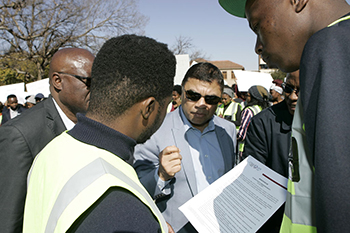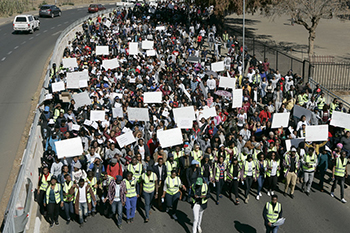
SK Luwaca, UFS SRC President; Thapelo Ngozo,
CUT SRC President, and Prof Francis Petersen,
UFS Rector and Vice-Chancellor, during the handover of the
memorandum at the Bram Fischer Building.
Photo: Johan Roux
The University of the Free State (UFS) and the Central University of Technology (CUT) united in a Student Safety Awareness March, which took place on Thursday 27 July 2017 from the UFS Bloemfontein Campus to the Bram Fischer Building.
The peaceful march had a turnout of approximately 1 500 students and staff from both institutions, led by the Student Representative Councils (SRC) from UFS and CUT. The purpose of the march was to hand over a memorandum to the Provincial Commissioner, Lieutenant General Lebeoana Tsumane, who acknowledged it on behalf of Mr Sam Mashinini, MEC for Police, Roads, and Transport in the Free State. The memorandum includes students’ demands regarding safety around student residential areas and general student safety in the city.
Prof Francis Petersen, UFS Rector and Vice-Chancellor, who – together with other members of the senior leadership group – was part of the march, says he is very impressed with the outcome of the march and the participation rate of both staff and students, as well as the joint efforts between the UFS and CUT to arrange the march.
Prof Petersen says, “There are public spaces where our students feel unsafe, and we would like the city and the province to seriously look into that and work with us to try and see if we could make those spaces safe.
A week filled with safety activities
The march was part of the Safety Week taking place from 24 to 28 July 2017, during which the UFS SRC, together with other stakeholders, took part in several activities on and off the Bloemfontein Campus. These included door-to-door visits to student homes and residences on and around campus, awareness campaigns at all the gates of the campus, and a Safety Dialogue held on 26 July 2017 at the Equitas Auditorium on campus.
The aim of the Safety Week was to focus on informing, educating, and encouraging students as well as the Mangaung community at large, to work together in creating a safe environment for students. The week started with the roll-out of an awareness campaign titled Reach Out, which was set to bring students and the community of Mangaung together to help decrease the number of violent crimes faced by students off campus. The communication plan included safety messages, using outdoor billboards, posters on lampposts around the residential student areas, local community radio stations, campus media, and the university’s social media platforms.

UFS and CUT students and staff, occupying the streets of
Bloemfontein during the Safety March.
Photo: Johan Roux
Accreditation of off-campus accommodation service providers
Over and above the Safety Week and safety awareness march, the university has initiated a number of other projects as part of its student safety strategy. This includes a process to accredit off-campus accommodation service providers in Bloemfontein who provide accommodation to students. The decision to accredit these service providers comes from a concern by the university management about the safety of students and the conditions under which some of our students live in off-campus accommodation. The accreditation process entails a list of primary requirements, drafted with the cognisance of the Mangaung Metropolitan Municipality and the SRC, in terms of off-campus accommodation to which private providers must adhere in order to be accredited by the university. The requirements are in line with the Policy on the Minimum Norms and Standards for Student Housing at Public Universities (Government Gazette 39238, dated 29 September 2015).
Transport to and from campus
Another project to be initiated on 31 July 2017 is a transport pilot project with Interstate Bus Lines to assist students with transport and access to the Bloemfontein Campus. The route includes various stops in the areas surrounding the campus, as well as a hop-on/hop-off route within the campus.
Released by:
Lacea Loader (Director: Communication and Brand Management)
Telephone: +27 51 401 2584 | +27 83 645 2454
Email: news@ufs.ac.za | loaderl@ufs.ac.za
Fax: +27 51 444 6393